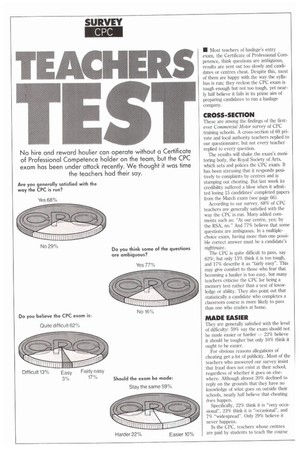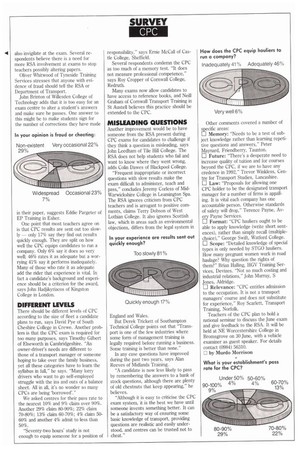TEACHERS
Page 36

Page 38

If you've noticed an error in this article please click here to report it so we can fix it.
No hire and reward haulier can operate without a Certificate of Professional Competence holder on the team, but the CPC exam has been under attack recently. We thought it was time the teachers had their say.
• Most teachers of haulage's entry exam, the Certificate of Professional Competence, think questions are ambiguous, results are sent out too slowly and candidates or centres cheat. Despite this, most of them are happy with the way the syllabus is run; they reckon the CPC exam is tough enough but not too tough, yet nearly half believe it fails in its prime aim of preparing candidates to run a haulage company.
CROSS-SECTION
These are among the findings of the firstever Commercial Motor survey of CPC training schools. A cross-section of 69 private and local authority teachers replied to our questionnaire; but not every teacher replied to every question.
The results will shake the exam's monitoring body, the Royal Society of Arts, which sets and polices the CPC exam. It has been stressing that it responds positively to complaints by centres and is stamping out cheating. But last week its credibility suffered a blow when it admitted losing 15 candidates' completed papers from the March exam (see page 66).
According to our survey, 68% of CPC teachers are generally satisfied with the way the CPC is run. Many added comments such as: "At our centre, yes; by the RSA, no." And 77% believe that some questions are ambiguous. In a multiplechoice exam, having more than one possible correct answer must be a candidate's nightmare.
The CPC is quite difficult to pass, say 62%; but only 13% think it is too tough, and 17% describe it as "fairly easy". This may give comfort to those who fear that becoming a haulier is too easy, but many teachers criticise the CPC for being a memory test rather than a test of knowledge or ability. They also point out that statistically a candidate who completes a classroom course is more likely to pass than one who studies at home.
MADE EASIER
They are generally satisfied with the level of difficulty: 59% say the exam should not be made easier or harder — 22% believe it should be tougher but only 10% think it ought to be easier.
For obvious reasons allegations of cheating get a lot of publicity. Most of the teachers who answered our survey insist that fraud does not exist at their school, regardless of whether it goes on elsewhere. Although almost 20% declined to reply on the grounds that they have no knowledge of what goes on outside their schools, nearly half believe that cheating does happen.
Specifically, 22% think it is "very occasional", 23% think it is "occasional", and 7% "widespread". Only 29% believe it never happens.
In the CPC, teachers whose centres are paid by students to teach the course also invigilate at the exam. Several respondents believe there is a need for more RSA involvement at exams to stop teachers possibly altering papers.
Oliver Whitwood of Tyneside Training Services stresses that anyone with evidence of fraud should tell the RSA or Department of Transport.
John Brinton of Willesden College of Technology adds that it is too easy for an exam centre to alter a student's answers and make sure he passes. One answer to this might be to make students sign for the number of corrections they have made
in their paper, suggests Eddie Pargeter of EP Training in Esher.
One point that most teachers agree on is that CPC results are sent out too slowly — only 17% say they find out results quickly enough. They are split on how well the CPC equips candidates to run a company. Only 6% say it does so very well; 46% rates it as adequate but a worrying 41% say it performs inadequately. Many of those who rate it as adequate add the rider that experience is vital. In fact a candidate's background and experience should be a criterion for the award, says John Hadjikyriacos of Kingston College in London.
DIFFERENT LEVELS
There should be different levels of CPC according to the size of fleet a candidate plans to run, says David Pye of South Cheshire College in Crewe. Another problem is that the CPC exam is required for too many purposes, says Timothy Gilbert of Elseworth in Cambridgeshire. "An owner-driver's needs are different to those of a transport manager or someone hoping to take over the family business, yet all these categories have to learn the syllabus in full," he says. "Many lorry drivers who want to go self-employed struggle with the ins and outs of a balance sheet. All in all, it's no wonder so many CPCs are being 'borrowed'."
We asked centres for their pass rate to the nearest 10% and 9% claim over 90%. Another 29% claim 80-90%; 22% claim 70-80%; 13% claim 60-70%; 4% claim 5060% and another 4% admit to less than 50%.
"Seventy-two hours' study is not enough to equip someone for a position of responsibility," says Ernie McCall of Castle College, Sheffield.
Several respondents condemn the CPC as too much of a memory test. "It does not measure professional competence," says Roy Cropper of Cornwall College, Redruth.
Many exams now allow candidates to have access to reference books, and Neill Graham of Cornwall Transport Training in St Austell believes this practice should be extended to the CPC.
MISLEADING QUESTIONS
Another improvement would be to have someone from the RSA present during CPC exams for candidates to challenge if they think a question is misleading, says John Leedham of 'file Hill College. The RSA does not help students who fail and want to know where they went wrong, adds Colin Dawes of Blackpool College, "Frequent inappropriate or incorrect questions with slow results make the exam difficult to administer, teach and pass," concludes Jeremy Corless of MidWarwickshire College in Leamington Spa. The RSA ignores criticism from CPC teachers and is arrogant to positive comments, claims Terry Dobson of West Lothian College. It also ignores Scottish law, which in areas such as environmental objections, differs from the legal system in England and Wales.
But Derek Trickett of Southampton Technical College points out that "Transport is one of the few industries where some form of management training is legally required before running a business. Some training is better than none."
In any case questions have improved during the past two years, says Alan Reeves of Midlands Training.
"A candidate is now less likely to pass by remembering the answers to a bank of stock questions, although there are plenty of old chestnuts that keep appearing," he believes.
"Although it is easy to criticise the CPC exam system, it is the best we have until someone invents something better. It can be a satisfactory way of ensuring some basic knowledge of transport, providing questions are realistic and easily understood, and centres can be trusted not to cheat." Other comments covered a number of mecific areas: LI Memory: "Needs to be a test of subject knowledge rather than learning repetitive questions and answers," Peter Maynard, Friendberry, Taunton.
LI Future: "There's a desperate need to increase quality of tuition and for courses beyond the CPC, if we are to have any credence in 1992," Trevor Winkless, Centre for Transport Studies, Lancashire. LI Law: "Proposals for allowing one CPC holder to be the designated transport manager for a number of firms is appalling. It is vital each company has one accountable person. Otherwise standards of safety will drop," Terence Payne, Aver Payne Services.
LJ Format: "CPC hauliers ought to be able to apply knowledge (write short sentences), rather than simply recall (multiplechoice)," George Swift, Watford College. Ei Scope: "Detailed knowledge of special types is only needed by STGO hauliers. How many pregnant women work in road haulage? Why question the rights of them?" Brian Hailing, HGV Training Services, Devizes, "Not so much costing and industrial relations," John Murray, S Jones, Aldridge.
0 Relevance: "CPC entitles admission to the occupation. It is not a transport managers' course and does not substitute for experience," Roy Scarlett, Transport Training, Norfolk.
Teachers of the CPC plan to hold a national seminar to discuss the June exam and give feedback to the RSA. It will be held at NE Worcestershire College in Bromsgrove on 30 June, with a vehicle examiner as guest speaker. For details contact (0984) 56310.
0 by Murdo Morrison




















































































































